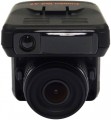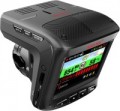Processor
Model of the processor used in the dashcam
The term "video chip" is used mainly for devices with classic capabilities, "processor" — for advanced models with an abundance of non-standard functions. However, anyway, we are talking about the same component — the main computing unit, the characteristics of which directly affect the capabilities of the recorder as a whole. Knowing the model of the processor, you can find detailed data on it and evaluate how satisfied you are with a device based on such electronics. Of the most advanced modern chips, one can name, in particular,
Ambarella A7L,
Ambarella A12,
Novatek NTK96655,
Novatek NTK96660 and
HiSilicon Hi3516.
Navigation
—
Speed on video. The ability to display data on the current speed of the car on the video being shot - usually in the form of numbers in one of the corners of the frame. As a rule, the device receives speed information from the built-in GPS sensor (see below). This function can be especially useful when analyzing ambiguous situations - for example, as additional evidence that the driver did not violate the speed limit.
—
GPS module. Built-in GPS satellite navigation module, which allows you to determine the current coordinates of the device. The specific ways in which this information can be used may vary depending on the other functionality of the registrar. Thus, it is data from GPS that is used to display speed on video (see above), as well as for the operation of the GPS informer and
GPS navigator described below. There are other options, sometimes quite original - for example, if you have
a 3G/4G modem, a beacon mode may be provided (
GPS tracker - see below).
—
GPS informant. A function that provides the driver with various useful information related to the current location. As the name suggests, the location itself is determined using GPS. One of the most popular ways to use an informant is to warn of approaching traffic cameras, stationary post
...s and speed control systems that are not detected by a traditional radar detector. In addition, other similar functions may be provided - for example, a message about an area with a high accident rate or a separate large hole on the road. To operate the GPS informer, a database of relevant objects is entered into the device’s memory; When purchasing, it doesn’t hurt to clarify what exactly this database contains, how fresh it is, and whether it allows for updating and manually adding points.
— GPS navigator. The device can operate as a full-fledged GPS navigator. For this, in addition to the GPS module itself, the design provides built-in maps, as well as a fairly large display to display them. This allows you to do without purchasing and using a separate navigator, but this function is not particularly popular in modern DVRs. Firstly, it significantly affects the cost of the device; secondly, a regular smartphone or tablet with GPS is often enough to navigate on public roads; thirdly, recorders most often have rather modest navigation capabilities and are often inferior even to smartphones/tablets, not to mention specialized devices.
— GPS tracker. Another function found in recorders with a GPS module (see above). A GPS tracker allows the device to operate in beacon mode, constantly transmitting data about the location of the car to one or another recipient - for example, taxi service dispatchers, the customer of cargo transportation, etc. Such beacons are also sold as separate devices, but it is easier (and sometimes cheaper) to buy and install a recorder with this function. In any case, it is worth considering that a 3G/4G modem is usually used to transfer data (see below) - so to use the tracker you will have to buy a SIM card and regularly pay for mobile communications.
— GLONASS. The device supports the GLONASS navigation system, the Russian analogue of the GPS described above. Most often, this function is provided in addition to the GPS module: simultaneous use of two systems improves the speed and accuracy of positioning, and also provides an additional guarantee in case of failures in one of them.
—Galileo. European satellite navigation system, created as an alternative to American GPS. Note that it is under the control of civilian departments, not the military. With a full fleet of 24 active satellites, the system provides an accuracy of up to 1 m in public mode and up to 20 cm with the GHA service. Working in conjunction with GPS, Galileo provides more accurate position measurements, especially in densely populated areas.Screen resolution
Resolution of the display installed in the recorder.
The higher the resolution (with the same diagonal) — the clearer the image is, but the more expensive the screen itself. At the same time, high resolutions are not needed to set the camera in the desired position and to work with the basic settings of the device. So you should pay attention to this parameter only if you plan to use additional functions that require a high-quality “picture” — for example, a GPS navigator (see “Functions”) or a remote camera that plays the role of a reversing camera.
HDMI
HDMI port is an output that allows you to use the recorder as an external player — namely, to broadcast video and audio from it to a TV, monitor or other video equipment that has the appropriate input. The HDMI standard is specially designed for high-definition content, it allows you to transfer even the highest quality video (up to and including UltraHD 4K); and inputs of this type are available in almost all video devices that support HD standards — in particular, in the vast majority of modern TVs. Note that a smaller version of the HDMI connector is usually installed in the recorder, and the appropriate cable is supplied in the kit, but the presence of the latter needs to be specified separately.

